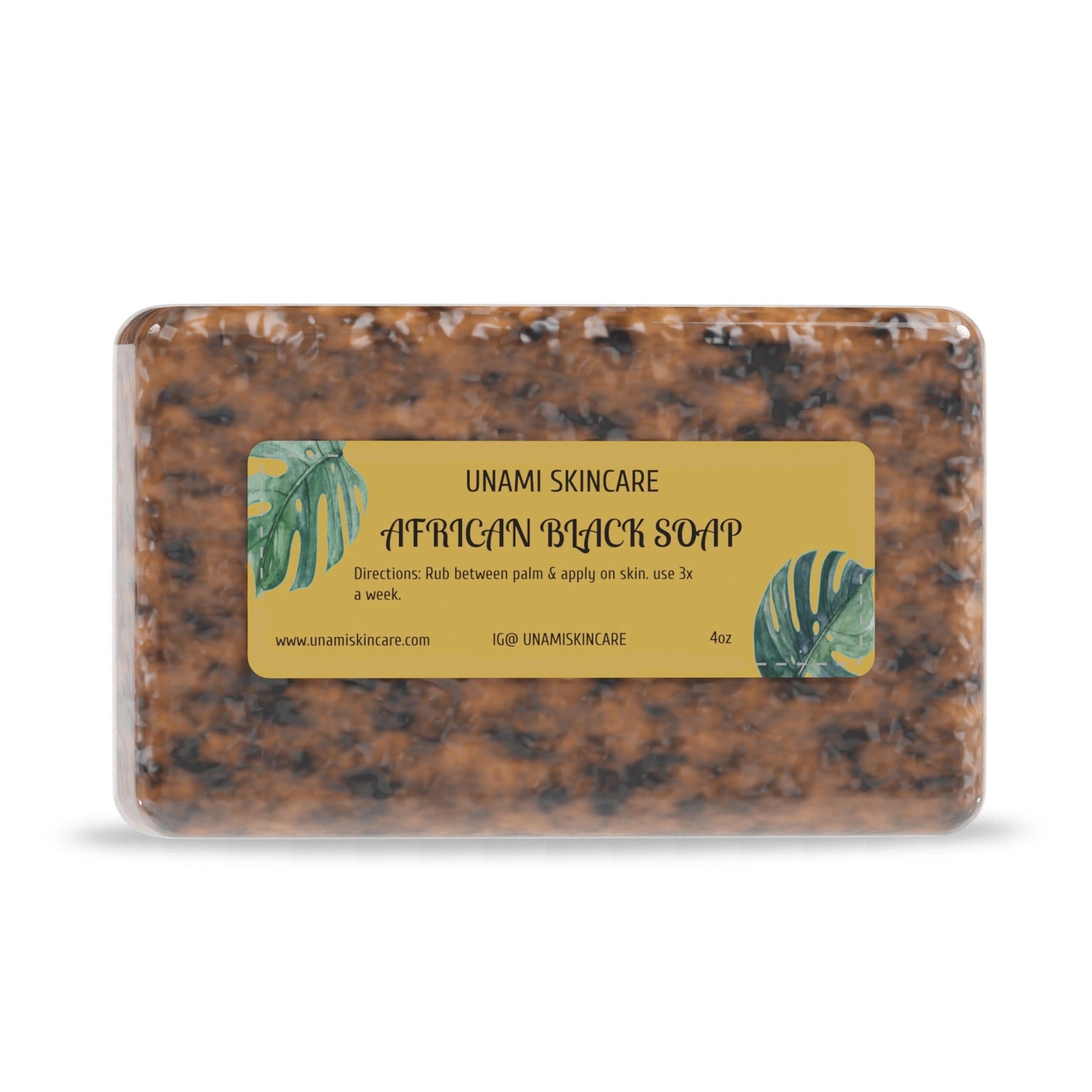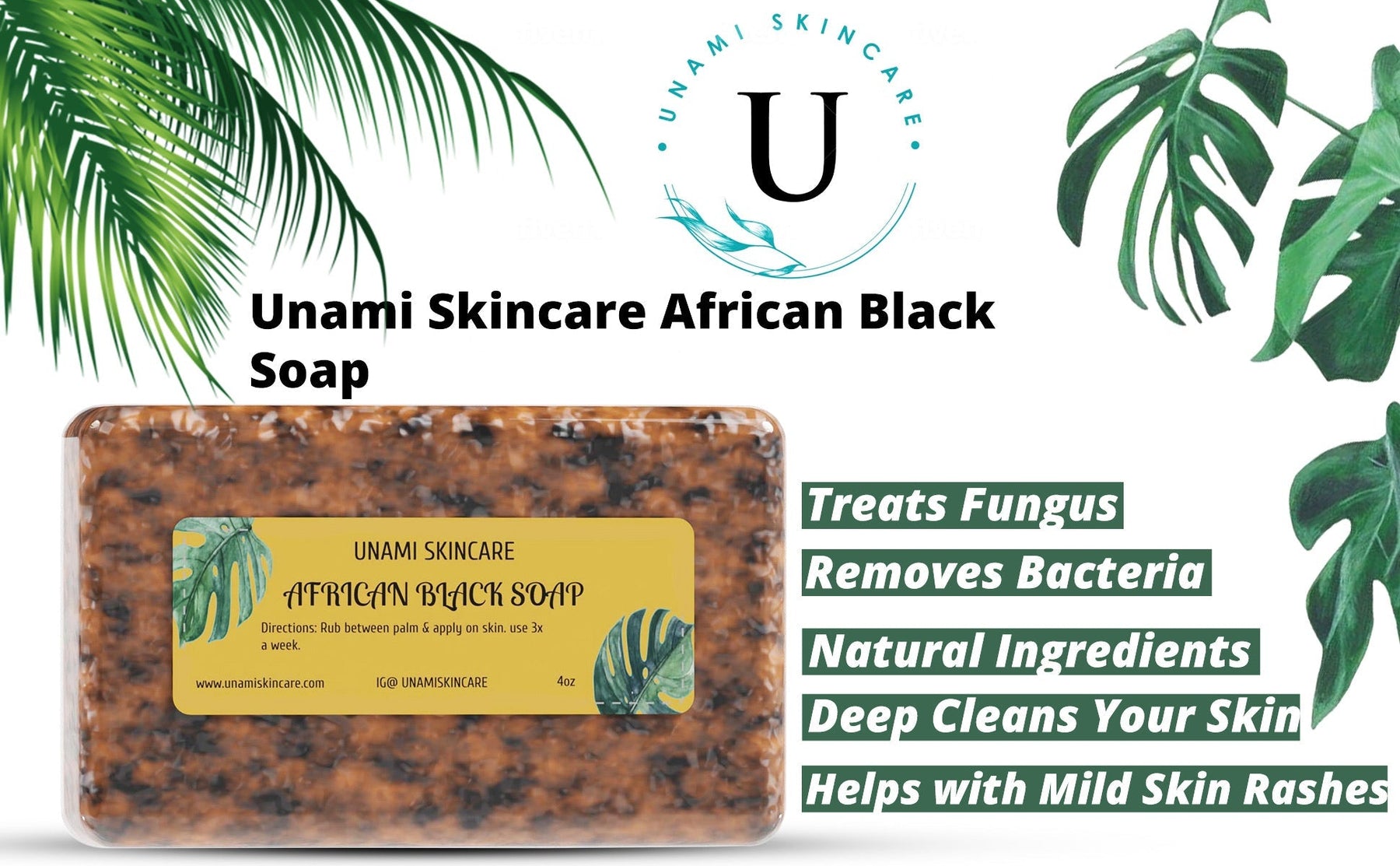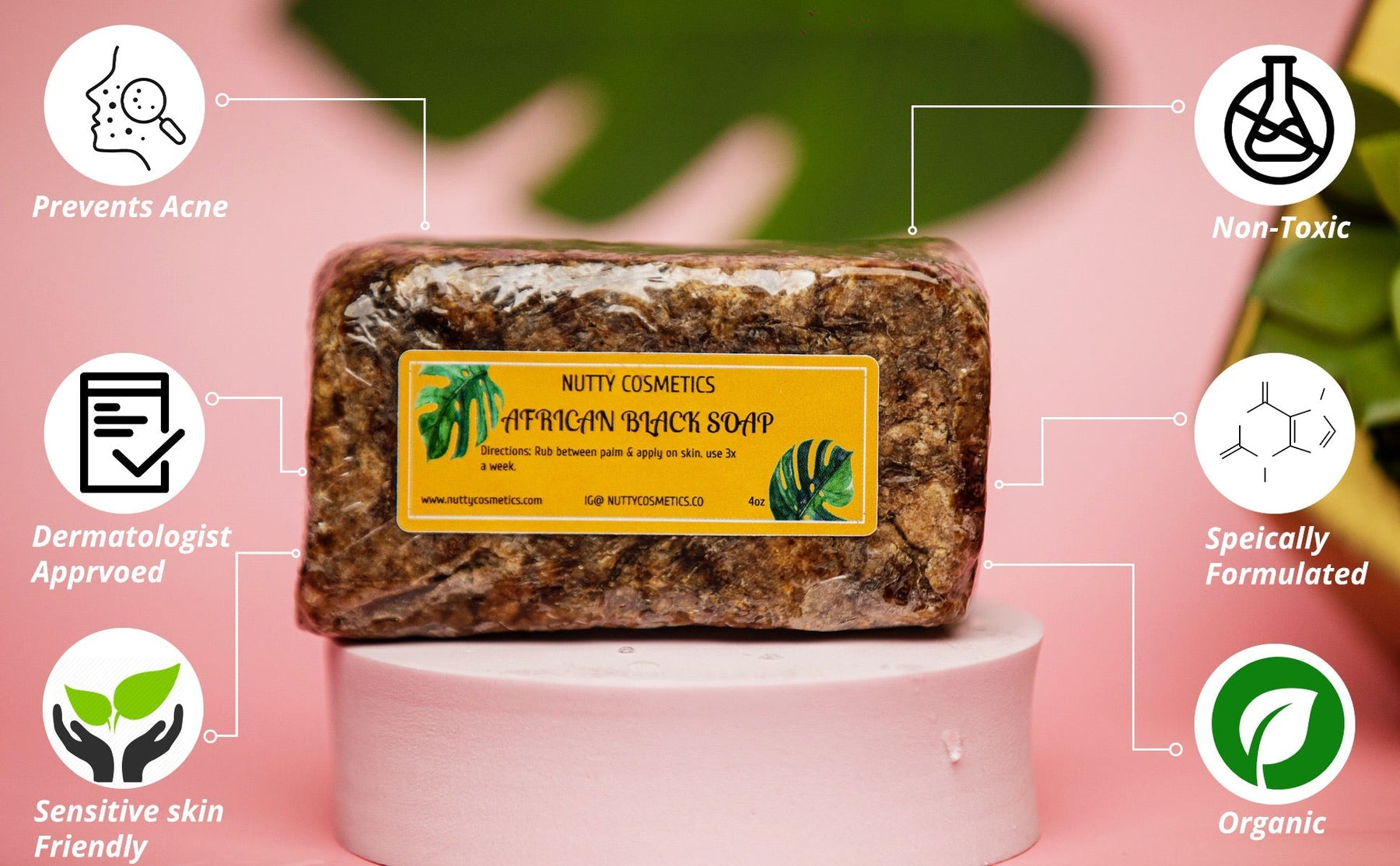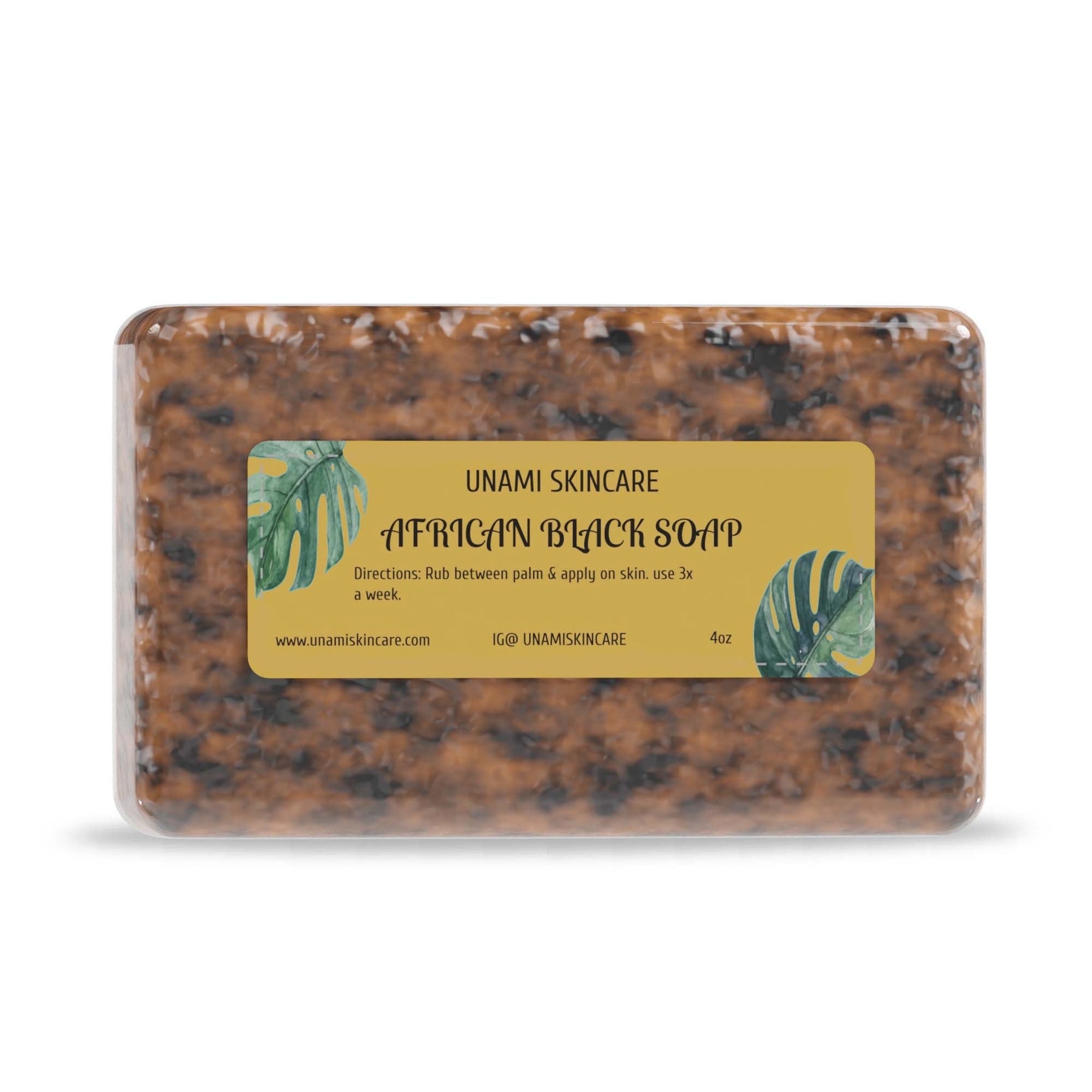



unamiskincare
African Black Soap
have you heard about the skin care benefits of african black soap?
this recently trending ‘must-have’ for your skin care routine has a history of use that goes back quite some time. African black soap is a traditional, plant-based soap from west africa.
so while some may swear by its ability to cleanse and nourish many different skin types, you may be wondering — is it worth the hype?
dermatologist alok vij, md, breaks down the benefits of african black soap and the right way to use it.
what is african black soap?
with natural antibacterial and exfoliating properties, african black soap acts gently to improve skin texture and tone. The soap also reduces inflammation and may help treat some signs of aging like dark spots or wrinkles. You can use african black soap on your face, hands, body — even your hair.
“african black soap has been around for ages, but we’re learning more and more how powerful and effective this cleanser can be,” says dr. Vij. “used properly, it can help protect your skin and may treat a variety of common skin conditions, from dandruff to acne. ”
african black soap was first produced in west africa centuries ago. Today, its exact ingredients depend on where it is made.
generally, african black soap doesn’t contain lye (a common soap component). It’s usually unscented without dyes or other additives. Most african black soaps contain one or more of these ingredients:
- cocoa pod ash, cocoa powder or cocoa butter.
- coconut oil.
- palm kernel oil and palm oil.
- plantain skin ash, leaves or bark.
- shea butter.
some african black soaps include honey, aloe vera, lime or camwood (a central west african tree) to enhance their ability to heal, protect and moisturize your skin. Others contain essential oils or oatmeal. Check labels for specific information, especially if you have allergies to skin care products.
what are the types of african black soap?
as the demand for african black soap has boomed, so has the variety of soaps available. Some are traditional, others more processed. And you have a wide selection of natural ingredients to choose from.
the real thing — authentic african black soap — is handmade with a dark gray or brown color and an uneven surface. It’s softer than commercial (machine-made) soaps, so its edges may slightly crumble. When it comes to this unique soap, imperfection is a good sign.
what does african black soap do for your skin?
studies have shown that it deep cleans and improves skin on par with other soaps, including cleansers with chemicals.
in a 2017 survey of 100 clients at new york dermatology clinics, 94% said they were either “very satisfied” or “somewhat satisfied” with using african black soap overall for their skin care.
“african black soap has multiple uses for every skin type, with benefits beyond providing a deep clean,” says dr. Vij. “we need more research to confirm whether it does even more than clean, but the results so far are promising. ”
dr. Vij cites 12 potential benefits of african black soap for your skin.
1. Removes bacteria
studies show that african black soap’s natural antibacterial ingredients work better than medicated cleansers to remove certain harmful bacteria, dirt and other impurities.
2. Deep cleans your skin
african black soap’s natural ingredients make it a thorough facial cleanser and makeup remover. Its oils and butters help dissolve makeup, while it effectively removes dirt from your face or body.
3. Exfoliates to help improve skin texture and tone
african black soap is much less smooth than other soaps, due to the ashes used to produce the soap, so it works as a natural exfoliant, removing dead skin cells before they clog pores and hair follicles. The plantain skins and leaves found in african black soap are naturally high in vitamin a, which can brighten your complexion, too.
“it’s a good alternative to chemical products if you’re looking for a product with natural ingredients,” says dr. Vij.
4. Reduces or prevents razor burn
if you’re used to having irritated skin or razor bumps after you shave, you may want to give african black soap a try. The oil and butter in african black soap may help soothe skin to prevent the aftereffects of razor burn.
in the survey of 100 users of african black soap, 92% said they were either “very satisfied” or “somewhat satisfied” with african black soap for razor bumps.
use it before shaving to soften your hair and make shaving easier.
“for some patients with acne or razor burn, mechanical exfoliation can make the condition flare up instead of get better,” says dr. Vij. “as always, beware when using a new product to see which way your skin goes. ”
5. Helps with mild skin rashes
some people use african black soap to improve rashes caused by eczema and other types of dermatitis, psoriasis and skin allergies. More research is needed to confirm these benefits of african black soap, says dr. Vij.
if your rash symptoms persist or worsen, even while using the soap, talk to your healthcare provider about treatment options.
6. Treats fungus
some research suggests african black soap may help control skin fungus, including a yeast called candida albicans. That means you may be able to use it to treat conditions like athlete’s foot and toenail fungus. The soap also may help control dandruff caused by fungus.
reduces inflammation
rich in vitamins a and e, african black soap’s antioxidants help shield your skin against inflammation and free radicals that damage skin cells. You may find this helpful for inflammatory skin conditions like rosacea.
11. Treats acne
african black soap may improve acne and balance the natural oils in your skin.
“african black soap may work for some people who have breakouts,” dr. Vij says. “the soap helps exfoliate your skin and open pores, while the sulfur and honey reduce inflammation. ”
12. Treats dandruff
yes! You can shampoo with african black soap, too. It may even help treat dandruff, thanks to its moisturizing ingredients. Use it like any other shampoo, lathering it into your hair and then rinsing it out.
“there is some evidence that the yeast which drives dandruff, or seborrheic dermatitis, can actually grow in cocoa butter or shea butter, so patients with dandruff may see their skin condition get worse instead of better,” says dr. Vij.
how to use african black soap
it may take some getting used to, but soon, african black soap could become a favorite part of your self-care regimen. First, try a little bit on a small area of your body (patch test), especially if you have dry or sensitive skin.
for extra moisturizing, if your skin feels tight after cleansing, choose a black soap that contains shea butter. You can also try adding honey to your soap. Remember, a little goes a long way. Using too much african black soap can dry out or irritate your skin.
you may find it best to use this soap only two to three times a week, switching it up with a gentler cleanser on the other days. Dr. Vij offers these extra tips:
- cut or pull a small portion of soap off the bar or dissolve it in water, so it’s smoother and gentler to use.
- lather the soap into your hands before applying to your face, body or hair.
- massage it into your skin with your hands or a washcloth for about 90 seconds in circular motions.
- rinse off completely.
- apply moisturizer and hair conditioner.
is it safe to use african black soap every day?
yes, it’s safe to add african black soap to your daily skin care routine. Clean and refresh your skin once or twice a day (morning and at bedtime) with the soap, followed by a skin toner and moisturizer. And don’t forget sunscreen!
side effects depend on your skin type and any allergies or intolerances you may have. Some soaps irritate those who have eczema or are sensitive to dyes, fragrances or other ingredients, like sulfur or cocoa. If your skin becomes red or irritated, try switching brands or discontinue use.
also be careful not to use this soap with chemical exfoliants. The combination may be too strong for your skin. If you have symptoms that persist or worsen, consult your dermatologist.



